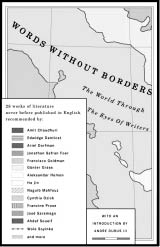Words Without Borders: The World Through the Eyes of Writers
by Laura Nathan

Many of us can visualize a tsunami-ravaged village, or how emaciated Zahara Jolie-Pitt was before her adoption from an Ethiopian orphanage, thanks to the Internet and around-the-clock news coverage. But how much do we really know about how people beyond US borders live? Apparently, not as much as we thought, according to Words Without Borders, an advocacy group for literature in translation, which reports that “50 percent of all the books in translation…published worldwide are translated from English [while] only 6 percent are translated into English.” Now that the organization has published 28 poems and pieces of fiction by writers from the Middle East, Europe, Africa, Latin America and Asia in its anthology, Words Without Borders, we need not remain oblivious.
To navigate this collection of works never before published in English, writers like Ha Jin, Jonathan Safran Foer, Günter Grass, Francine Prose and Nobel Laureate Naguib Mahfouz introduce each selection. Foer uncovers the anthology’s meaning in his foreword to Ma Jian’s “Where Are You Running to?”: “Readers are always running toward the same place when they open a book. We’re trying to get a greater understanding of ourselves.” And so we do—through Eleonora Hummel’s tale of ethnic German living in Russia, through Saniyva Saleh’s lyrical search for gender equality, through Senadin Musabegovic’s revelation that war is always waged against the body, through Juan José Saer’s look at the capriciousness that haunts the natural world and human relationships, through Johan Harstad’s narrative of a psychoanalyst treating a Vietnamese woman burned in a napalm bombing.
The inclusion of nonfiction essays might have given the collection even more depth, but their absence comes with the territory. Many of these writers have taken a political risk by publishing their words, making the “fiction” label their only refuge. Fiction or not, the wounds illuminated in these pieces feel authentic, informed by experience with the pain, loss and love that define human existence both within and far beyond US borders. By offering a greater understanding of the struggles that unite and divide us, these selections share what Andre Dubus III calls in the collection’s introduction, “the affirming cry of human expression.”
|
Issue Navigation> Issue Index > v6n14: Polonia on Parade (4/5/07) > Book Reviews > Words Without Borders: The World Through the Eyes of Writers This Week's Issue • Artvoice Daily • Artvoice TV • Events Calendar • Classifieds |









 Current Issue
Current Issue